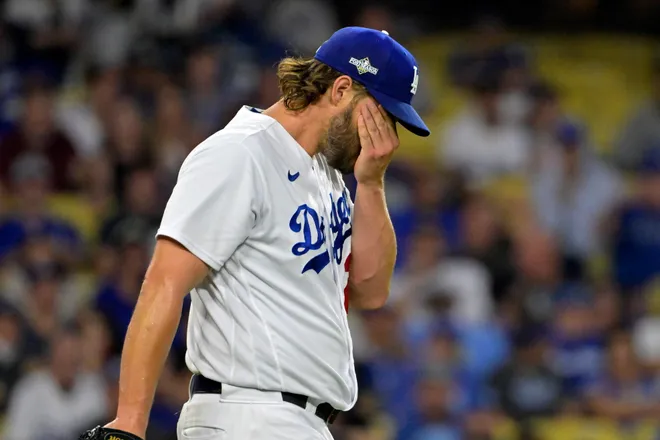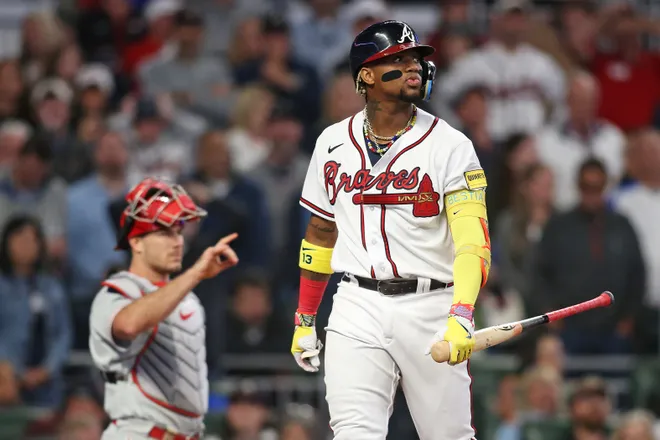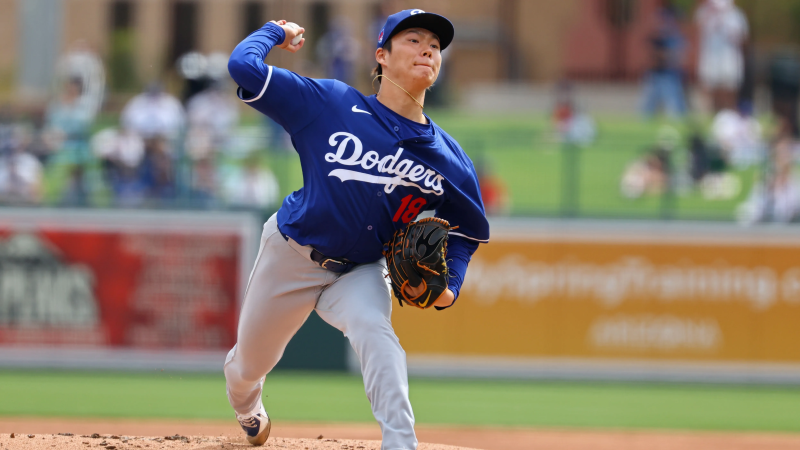MLB's best teams keep getting bounced early in October. Why is World Series so elusive?
It is the game’s most consistently dominant run this century. And yet it still befuddles.
For the past 11 seasons, the Los Angeles Dodgers have reached the playoffs, 10 times by winning the National League West. They’ve strung together five seasons of at least 100 wins, claimed three NL pennants, but have only a shortened-season championship to show for it.
It is not for lack of belief.
“I don’t think there was a bad team we played on where we didn’t have expectations to be the last team standing,” says Justin Turner, the 39-year-old infielder on board for nine of those postseason excursions.
“Every year you fall short is disappointing. Because it’s always like, ‘Oh, this is the year. Wow, we’re so good.’
HOT STOVE UPDATES: MLB free agency: Ranking and tracking the top players available.
“And then baseball happens.”
The Dodger experience – a dominant regular season from spring to autumn, followed by a “Wha’ happened?” moment come October or November – is becoming increasingly common through Major League Baseball, exacerbated by the expanded playoffs yet with roots that go back three decades.

Or perhaps you’re too young or don’t remember the general disregard shown the 1990s-2000s Atlanta Braves, who won 14 consecutive NL East championships yet just one World Series, in 1995.
That title momentarily quieted talk that those Braves were the Buffalo Bills of baseball, although an association with the four-time Super Bowl losers would return by 1999 and, even a decade later, attach itself to Turner’s Dodgers.
Yet as years and decades pass with baseball’s ever-growing playoffs, it’s clear just how anomalous the New York Yankees’ three straight titles – and four in five years – from 1996-2000 really were.
The 1991-2004 Braves: Fourteen consecutive playoff trips, one championship.
The 2013-2023 Dodgers: Thirteen consecutive playoff trips, one shortened-season championship.
The 2018-2023 Braves: Six consecutive playoff trips, one championship.
The 2019-2023 Rays: Five consecutive playoff trips, zero championships.
Since 2014, the Houston Astros (2017, 2022) are the only franchise to win multiple titles, one of them coated in controversy. Everyone else is left with little or nothing to show for their efforts – no matter how consistent they are.

All about the 'hot hand'
Kind of hard to believe, but this generation’s Atlanta dynasty is nearly halfway to the impressive but frustrating benchmark set by the Braves of Maddux, Glavine, Smoltz and the Joneses.
That frustration was exacerbated the past two seasons, when the Braves followed up a 2021 World Series title with 101- and 104-win seasons – only to suffer NLDS setbacks to 87- and 90-win Philadelphia Phillies teams that wormed in through extra wild-card slots.
Winning it all with an 89-win team and then going four-and-out with 100-win powerhouses has caused Braves GM Alex Anthopoulos to question what he really knows about winning in the playoffs.
“Zero,” he says unhesitatingly. “I wish I had an answer. If I did, we’d be winning every year.
“After ’21 I’m like, ‘OK, this is how you do it.’ And then you get bounced the next two years.”
Those Braves and Dodgers NLDS eliminations the past two years – though the Dodgers’ pitching was quite depleted in 2023 – ramped up the usual discourse about playoff equity and the effect of multi-day layoffs.
The outcomes were palatable, however.
In 2022, the 106-win Astros held off the Phillies to win the World Series. Last year, the 90-win Texas Rangers – who equaled the Astros’ win total atop the AL West but were a wild-card team – won it all.
No club in its right mind would choose to play an additional round of playoffs to avoid perceived rust. The Rangers’ sweeps in the wild-card and ALDS rounds greatly aided their cause and erased the handicap of the extra round.
Yet there’s no formula to bottle come October.
“I’m starting to learn that the hot hand is so incredibly important,” says Braves first baseman Matt Olson, a veteran of five postseasons, including Atlanta’s past two first-round exits.
“In almost every aspect, baseball is a contagious sport. You ride the momentum and the ups and downs and it’s all about getting hot.”
Olson says perhaps the biggest factor is the ability for bullpen arms to reload, thanks to frequent off days coming after just two or three consecutive games. Lower-leverage arms simply aren’t used, and a 1-2 punch atop a rotation usually goes a long way.
Sometimes.
'Doesn’t matter what it says on paper'
Tampa Bay Rays GM Erik Neander has led his club to five consecutive postseasons, and they pushed the Dodgers to six games in the 2020 World Series. Three consecutive first-round exits followed, even as Neander was supremely confident because aces like Shane McClanahan, Tyler Glasnow and Zach Eflin were aligned to start in short series.
The Rays won 99 games in 2023. The Rangers dusted them in two playoff games, by a combined 11-1 score.
“I don’t want to fall in the temptation of, ‘Oh, it’s two games, anything can happen in two games.’ As an industry, we all kind of accept that,” says Neander. “But I don’t like saying it, because it just feels like an excuse. No one that wins a series says, ‘Oh, it’s just two games!’ Because they won. There’s something to it, right?
“It’s just wasted energy. OK, so what. The format’s the format. This past year, I didn’t see many people saying, ‘I think Texas is about to go undefeated on the road in the playoffs.’ They stumbled through September, right?
“And then they hit the gas and they went.”
Neander and other lower-revenue clubs that might be more platoon-inclined in their alignment are occasionally criticized for designing their rosters too far toward sustainability. The Rays’ mindset is to create as many shots at the playoffs as possible, even at the extent of constructing a more optimal team in a given year.
That’s what makes the Dodgers’ run so mystifying: Since 2013, they’ve made the playoff field, and employed veritable super teams in many of those years.
In 2021, they had an embarrassment of riches: A Corey Seager-Trea Turner double-play combo that would fetch $625 million in free agency, Max Scherzer added to the rotation, Mookie Betts in his prime, and 106 wins in the bank.
Which meant nothing against an 89-win Braves team riding a hot streak from Dodger discard Joc Pederson.
“Baseball’s probably the only sport,” says Turner, “where it doesn’t matter what it says on paper. Maybe hockey is closer to baseball than any other one.
“It’s a tournament. And anything can happen in a tournament. The tournament is hard to win, especially when you’re adding rounds.”

'Fight like hell'
It’s yet another thing that makes baseball incongruent with other sports more firmly ingrained in pop culture at the moment. After all, LeBron James and Giannis Antetokounmpo and Steph Curry and Kevin Durant all have their championship rings.
What’s Mike Trout’s problem? If Tom Brady can win seven Super Bowls, can’t Clayton Kershaw win more than one World Series?
“I tell our guys, yeah, we wanna win the World Series, expect to win,” says Braves manager Brian Snitker, who’s guided their past six division champions. “But as we witnessed, I think, by winning the World Series, a lot of things have to go right.
“Especially in our sport.”
Including, to some degree, circadian rhythms. Turner notes the automatic five days off granted the top two division winners can be a boon or bane, depending on a team’s health situation or whether they’re playing particularly well right then.
For the Rangers, jumping right into the wild-card pool seemed therapeutic after a cross-country flight from Seattle, where they’d blown a chance at the division title. The team won its first seven playoff games, six of them on the road, and went 13-4 in capturing the first championship in franchise history.
It didn’t hurt they had four-time World Series champion manager Bruce Bochy in the dugout, along with Seager, quickly growing into one of the clutch postseason performers of his era.
Yet as they swept up the champagne corks and confetti, the Rangers did not leave behind a trail map leading to the last game of the year. The obstacles may change, but the path there never does.
“It’s getting harder – the number of teams, the layoffs,” says the Braves’ Snitker.
“But you know what? We’re going to fight like hell to win the division again.”
Disclaimer: The copyright of this article belongs to the original author. Reposting this article is solely for the purpose of information dissemination and does not constitute any investment advice. If there is any infringement, please contact us immediately. We will make corrections or deletions as necessary. Thank you.





